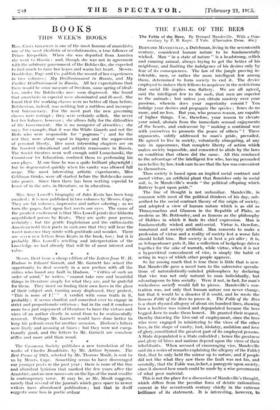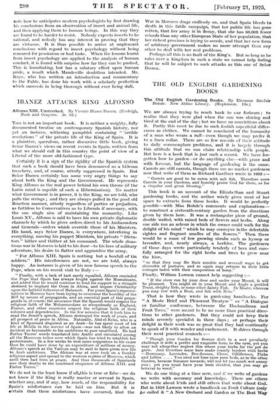THE FABLE OF THE BEES
BERNARD MANDEVILLE, a Dutchman, living in the seventeenth century, considered human nature to be fundamentally wicked. Man " in a state of nature " is a headstrong, selfish and cunning animal, always trying to get the better of his neighbour, and limiting the indulgence of his desires only by fear of its consequences. The law of the jungle proving in- tolerable, men, or rather the more intelligent few among them, determined to form society to end it. The device employed to induce their fellows to acquiesce in the restrictions that social life implies was flattery. We are all agreed, said the intelligent few to the mob, that men are superior to the animals ; but unless you obtain mastery over your passions, wherein does your superiority consist ? You indulge your desires and propagate the species ; foxes do no more, and no less. But you, who possess reason, are capable, of higher things. Use, therefore, your reason to elevate your mind, abstain from the immediate sensual enjoyments. of the beasts, and endeavour by " making a continual war. with yourselves to promote the peace of others " ! These arguments, subtly addressed to man's pride, prevailed. lie agreed to live in society, voluntarily abnegating, at any rate in appearance, that complete liberty of action which makes society impossible, and consented to abide by the laws on condition that others did the same. All this conduced to the advantage of the intelligent few who, having persuaded men to live by law, took care to see that the law was convenient to themselves.
Thus society is based upon an implied social contract and moral virtue, an artificial plant that flourishes only in social soil, is, in Mandeville's words " the political offspring which flattery begot upon pride."
The line of thought is not unfamiliar. Mandeville, in common with most of the political thinkers of his day, sub- scribed to the social contract theory of the origin of society, and adopted a view of human nature which is as old as Thrasymachus and Glaucon in the Republic of Plato, as modern as Mr. Bottomley, and as famous as the philosophy of Hobbes in which it finds its chief expression. Man is fundamentally wicked and anti-social. Virtue is, therefore, unnatural and society artificial. Man consents to make a profession of virtue and a reality of -society lest a worse fate should befall him. But society is at best a pis alter ; it is, as Schopenhauer puts it, like a collection of hedgehogs driven together for the sake of warmth, while virtue, when it is not a hypocritical conceahnent of vice, is simply the habit of acting in ways of which other people approve.
So far among much that is true there is little that is new. But Mandeville gave a novel turn to the subversive specula- tions of naturalistically-minded philosophers by declaring that vice was not only natural to man individually, but advantageous to him socially. Were it not, in fact, for man's wickedness society would fall to pieces. Mandeville's con- tention was, not only that human nature can never change, but that it would be a disaster if it could, and he wrote the famous Fable of the Bees to prove it. The Fable of the Bees is a short rhymed allegory of about six hundred lines, showing how a beehive was ruined and depopulated because the bees begged Jove to make them honest. He granted their request, thereby throwing the hive out of employment, since the bees who were engaged in ministering to the vices of the other bees, in the shape of vanity, lust, idolatry, ambition and love of glory, constituted the greatest part of its employed persons. A State depopulated is a State enfeebled ; hence the greatness and glory of hives and nations depend upon the vices of their inhabitants. When accused of encouraging vice, Mandeville said (in a series of remarks explaining the allegory of the Fable) first, that he only held the mirror up to nature, and if people did not like what they saw there the fault was not his, and secondly, that the Fable was, in fact, a panegyric upon society, since it showed how much could be made by a wise government of what poor material.
This is not the place for a discussion of Mandeville's thought, which differs from the peculiar form of deistic rationalism current in the seventeenth century chiefly in the extreme brilliance of its statement. It is interesting, however, to
note how he anticipates modern psychologists by first drawing his conclusions from an observation of insect and animal life, and then applying them to human beings. In this way they are found to be harder to resist. Nobody expects insects to be rational, and nobody has any interest in proving that they are virtuous. It is thus possible to arrive at unpleasant conclusions with regard to insect psychology without being censured for pessimism or bad taste. When the lessons learnt from insect psychology are applied to the analysis of human conduct, it is found with surprise how far they can be pushed. This is humiliating, but has a salutary effect upon human pride, a result which Mandeville doubtless intended. Mr. Kaye, who has written an introduction and commentary to the Fable, has done his work with a scholarly perfection which succeeds in being thorough without ever being dull.











































 Previous page
Previous page